Congratulations to Yosef for his new paper, showing that honey bee workers differ in substantial ways in their gut microbiome, depending on whether they were performing hygienic behavior (doi:10.1007/s00040-025-01029-x). Whether these differences are cause or consequence is another question….
Author: rueppell
Nothing against vaccines, but they don’t always work
In her first scientific publication from our lab, Prabashi describes a study that we conducted to test whether heat-inactivated Israeli acute paralysis virus could be used to vaccinate queens and protect their offspring against active IAPV. Unfortunately, the offspring of both experimental groups died of IAPV indifferently and no significant effect of maternal treatment was found.
Resistance to Varroacides
Documenting widespread resistance in Alberta to common pesticides against Varroa destructor highlights the problems of the apicultural industry to contain this honey bee pest. This important publication also supports the argument that new approaches to control Varroa are urgently needed.
Lab conference action
This past week, we were quite busy presenting our research with Alex and Chenoa giving presentations at the Breeders Day of the Alberta Beekeepers Commission, Demi an Alyssa presenting at the Integrated Pest Management meeting, and Rassol and Olav participating in the CAPA meeting and Canadian National Beekeeping Convention in Ottawa with presentations on mites and viruses. Excellent work!

Alexander Walton wins Project ApisM Bellow’s Award
Congratulations to Alex for a well-produced video to explain his 2024 research project on the queen retinue. This project, funded by NAPPC, involved has generated some interesting findings on the virus content and susceptibility of retinue workers and Project ApisM is recognizing Alex’s production at the ongoing American Bee Research Conference with the Bellow’s Award!
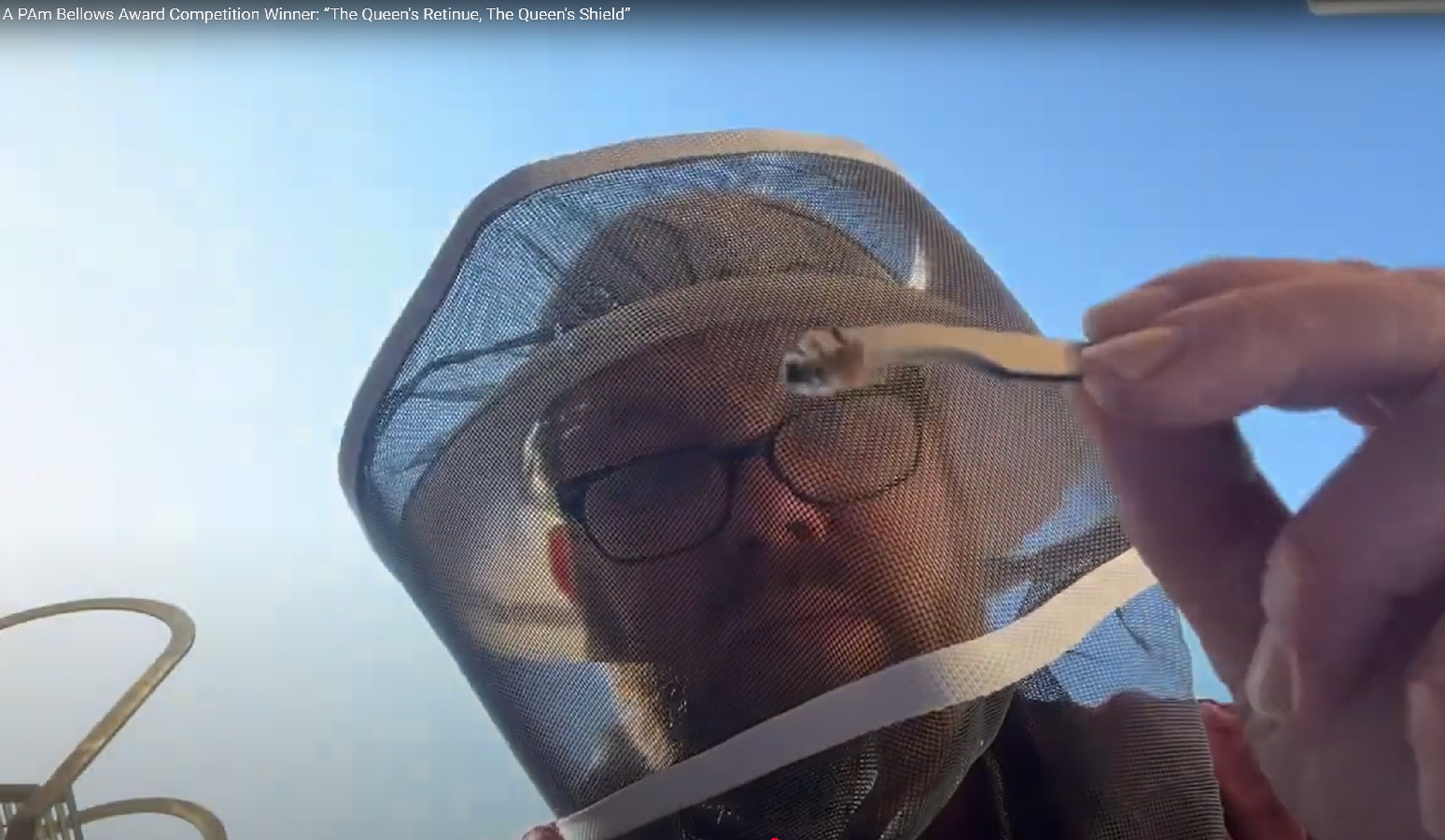
Two Publications on Recombination in Social Insects
A long-term project by former postdoc Bertrand Fouks has finally come to its conclusion in form of a publication entitled “Alternative double strand break repair pathways shape the evolution of high recombination in the honey bee, Apis mellifera.” At the same time former undergraduate researcher Tim DeLory (now PhD student with Karen Kapheim in Utah) has taken the lead to give a new perspective on the high recombination rates in social insects, published in the Annual Review of Genetics.
Alberta Beekeepers Commission Conference
This year’s ABC AGM Conference & Trade Show, Rassol presented an update to our Varroacide development project, Olav presented together with Leslie Holmes on the collaborative Alberta stock comparison project, and Chenoa won hockey tickets in the banquet’s Kahoot game after already being awarded an ABC bursary award. What a great meeting!
Congratulations for Prabashi (twice!)
Congratulations for Prabashi to successfully transition from MSc to PhD status in our graduate program at the end of this semester. Good progress on three separate projects propelled her forward! And just before transitioning, she received the Entomological Society of Canada’s Post-Graduate (MSc) scholarship. Wonderful news and definitely made her trip to the ESC conference twice as rewarding! She gave a great presentation too:
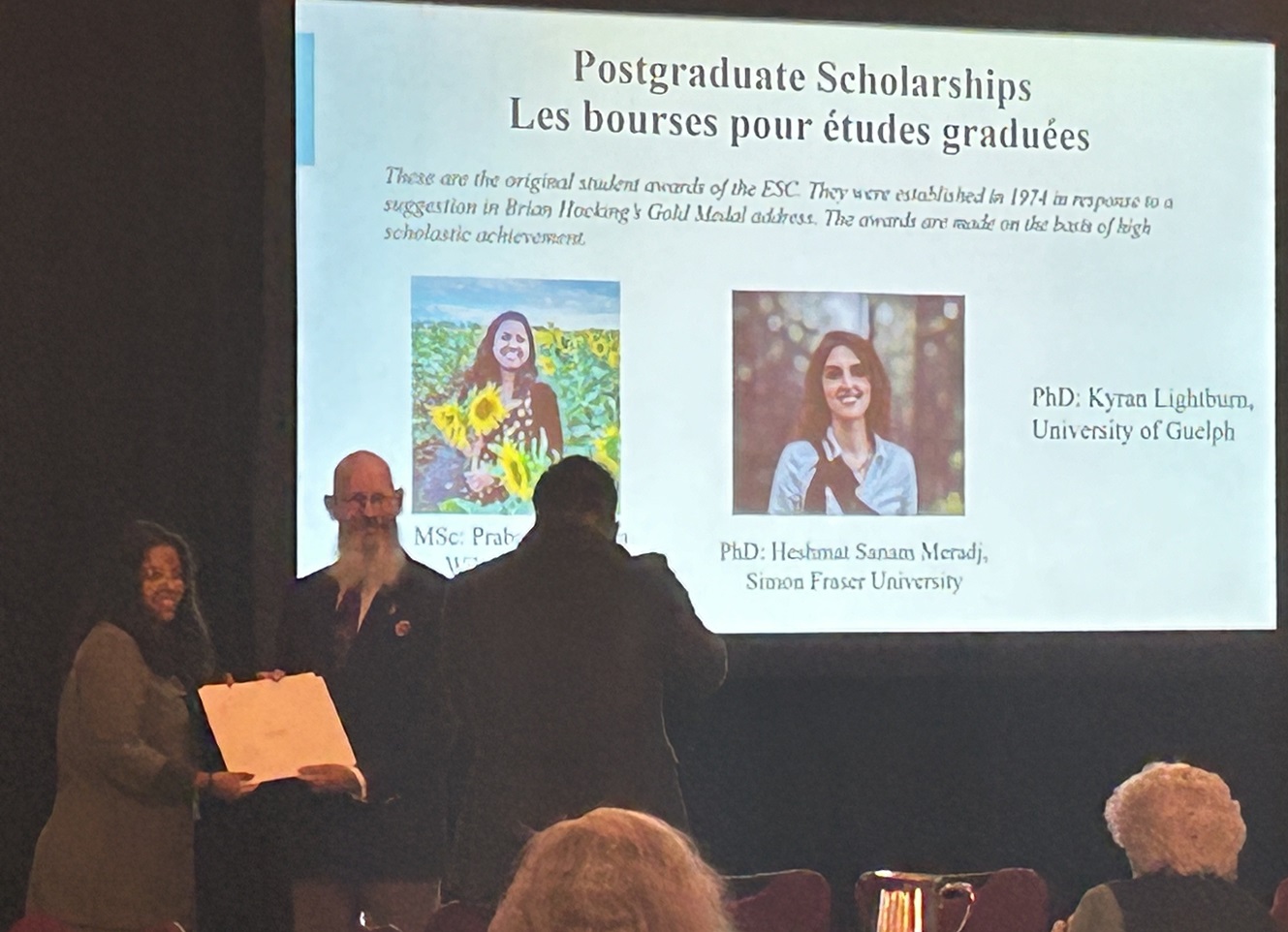
Chenoa wins presentation award at the Entomological Society of Alberta conference
Despite some tough competition from graduate and undergraduate students, Chenoa was awarded the best student presentation award in her session. Demi, Prabashi, Breanna, Alyssa, and Rassol also gave excellent presentations on our research, so congratulations to all.
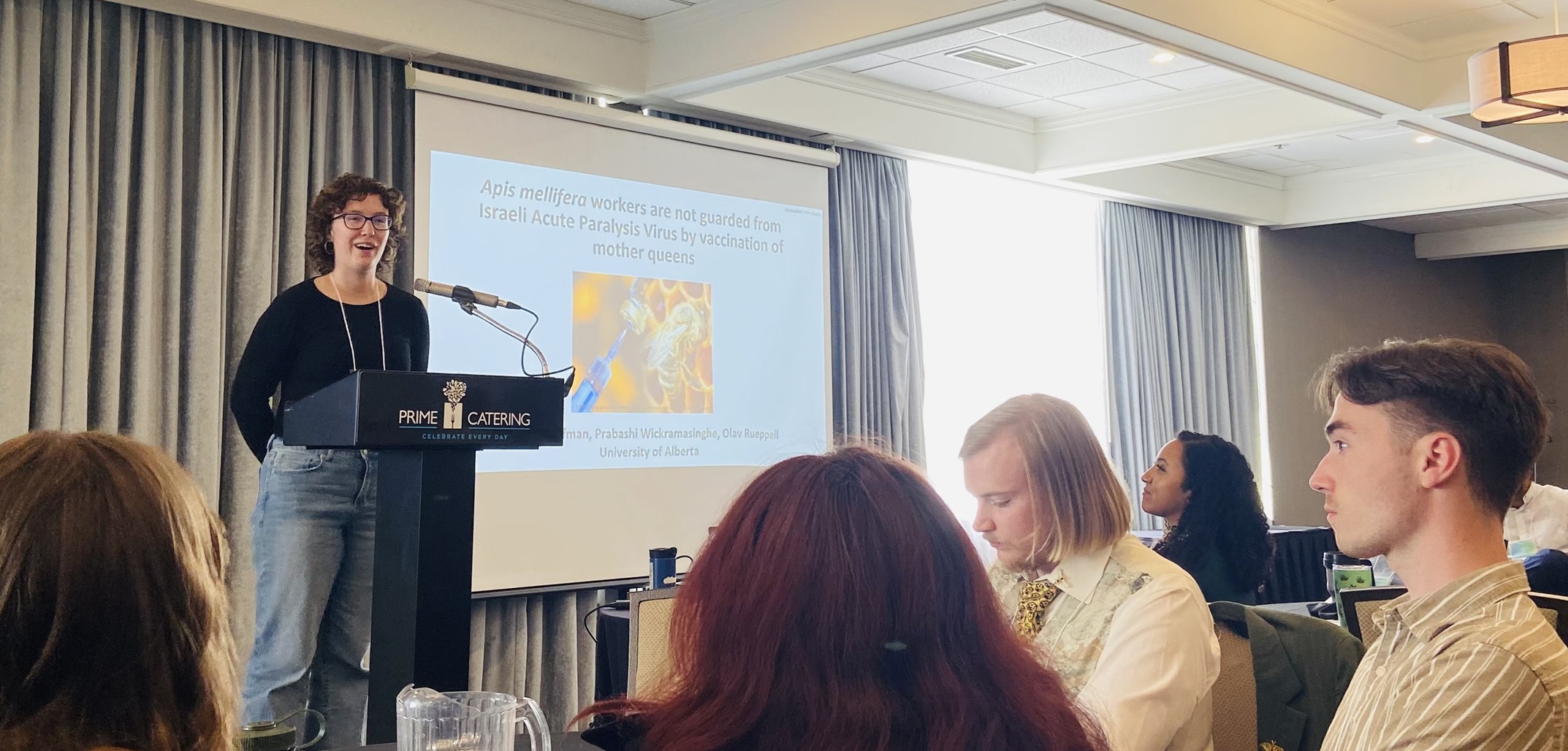
Well done!
International Student Conference
Mingcong and Vanessa presented their research into virus transmission across experimental social networks at the International Research Symposium of the University of Alberta! Congratulations, well done!
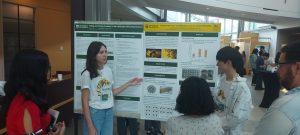
Varroa preference for drone brood
The question of why Varroa might prefer invading drone brood is easily answered: They have more time to produce offspring due to the longer development of the male pupae. However, Yves Le Conte’s great discovery that Varroa hones in on male-produced chemicals (DOI:10.1126/science.245.4918.638) may only part of the answer to the question of how the Varroa foundresses preferentially invade drone cells. It might also have to do with opportunity as we show in this collaborative publication lead by former MSc student Taylor Reams (doi:10.1093/jisesa/ieae044) that drone cells are more visited by nurse bees, and more visitation by nurse bees is associated with higher Varroa infestation probability (although this important result isn’t really clear when you just read the abstract).
Group size and hygienic behavior…
…have a complicated relationship. If you want to know the details, read our new article. Generally speaking, larger groups of honey bees are better than smaller ones in performing hygienic behavior. Thus, hygienic behavior follows a common trend, but the mechanism is unclear.
Franklin & Maria Butz Memorial Graduate Award
Congratulations to Jacob Herman for winning the Franklin & Maria Butz Memorial Graduate Award! I cannot think of a better winner because Jake has the same drive for continuous innovation and improvement that we can see in the Butz Apiary. Here is Jake with some of his favorite bees during field work in Thailand: 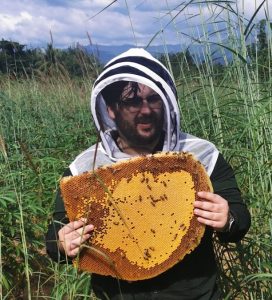
Cold Spring Harbor Conference
The Cold Spring Harbor conference on the Genomics and Biology of Social Insects (co-organized by Olav) just concluded successfully and some cutting edge research was presented. Presentations included our work on egg size plasticity in honey bee queens and our new “Weak Worker” hypothesis for explaining division of labor in social insects. The social insect research community is truly amazing although its choral qualities remain to be tested (photo below).
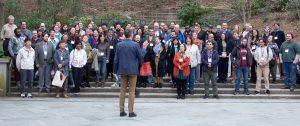
Congratulations to our students
Congratulations to Jake and Heather for winning first and third place among the oral presentations at the RE Peter Biology Conference in their respective categories! Scientific communication is so important: Well done!
Social life leads to social stress protection
In an extension of the concept of social immunity, we explain in our latest publication that defense mechanisms against stressors that are not pathogens or parasites can also occur at the group level and that group-level adaptations might exist that might proximally explain some behavior and life history patterns in social insects. For more information, check doi: 10.1111/brv.1307.
Varroa feeds on fat body and hemolymph
The world is often complicated. This turns out to be true also for the feeding habits of the ectoparasitic mite Varroa destructor. The long-held belief that Varroa was primarily feeding on the blood (hemolymph) of its honey bee hosts was overthrown by a paradigm-shifting study by Ramsey et al. in 2019, which demonstrated that dispersing Varroa primarily feed on fat body of their adult honey bee hosts. This should be adaptive, given that the fat body is readily accessible from the mites’ hiding spots between the bees’ abdominal segments and the fact that adult honey bees do not contain a lot of hemolymph. However, in our more comprehensive study, we could show that during the reproductive phase that is spent on honey bee brood, Varroa primarily feeds on the hemolymph, similar to another bee mite, Tropilaelaps, which only feeds on bee brood. This complex alternation of feeding habits in accordance with the life stage of parasite and host is a reminder how complex biological interactions are and that we must continue our quest for understanding the natural world around us.
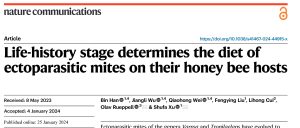
American Bee Research Conference
In three important and novel presentations at the ABRC meeting, our lab was well represented in New Orleans this past week!
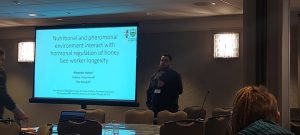
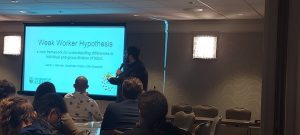
New Publication by Robert on the genetic architecture of viruses !
Virus tolerance and virus resistance are two different things, and on top of that they might be controlled by different genes for different viruses. So, the interactions between honey bees and their viruses are complicated and much research lies ahead of us: See the article at this link.
New Varroacide Testing Protocol
In a new study Rassol describes his newly developed testing method for current and putative Varroacides. Check it out here: https://onlinelibrary.wiley.com/doi/pdf/10.1002/ps.7891
